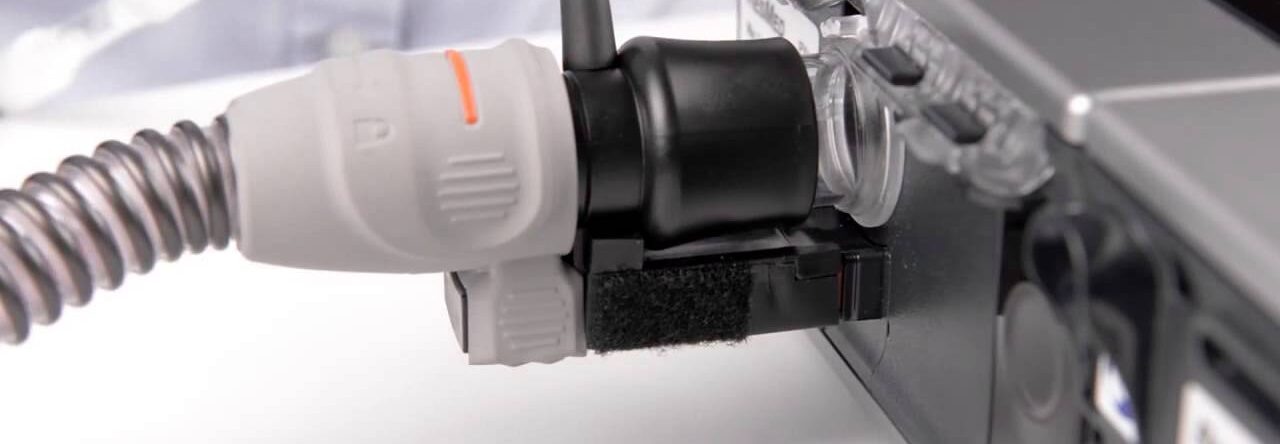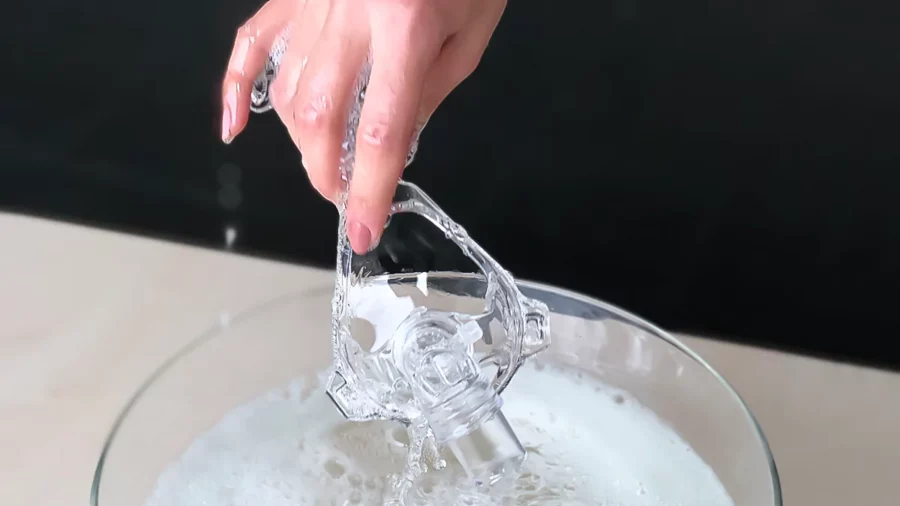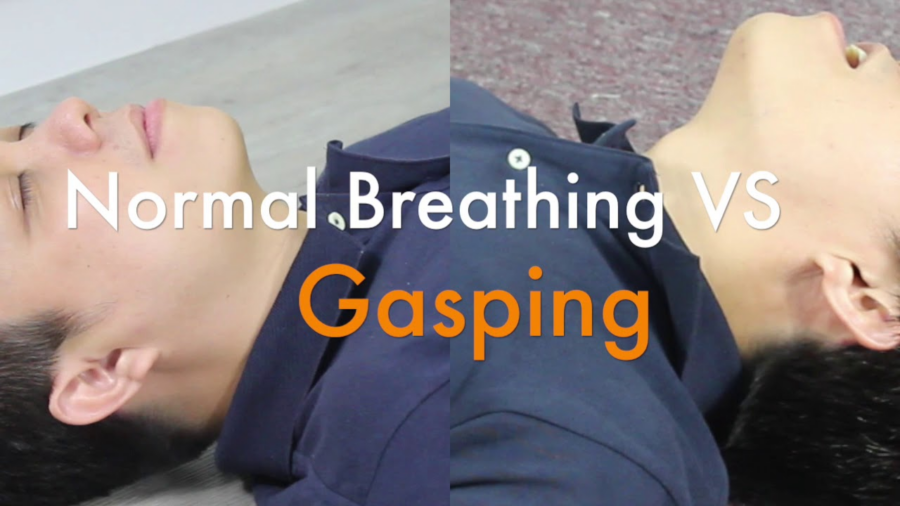Understanding the Importance of Regular CPAP Mask Maintenance
Sleep apnea is a serious condition that affects millions of people worldwide. Continuous Positive Airway Pressure (CPAP) therapy is commonly prescribed to treat sleep apnea and help patients breathe more freely during sleep. A crucial component of CPAP therapy is the CPAP mask, which delivers the pressurized air into the airway. To ensure optimal performance and a comfortable experience, regular cleaning and maintenance of the CPAP mask should be a priority for every CPAP user.
The Role of a CPAP Mask in Sleep Apnea Treatment
The CPAP mask plays a vital role in the effectiveness of sleep apnea treatment. It creates a seal around the user’s nose and/or mouth, allowing the pressurized air from the CPAP machine Australia to be delivered directly into the airway. This continuous flow of air helps keep the airway open, preventing interruptions in breathing and reducing the occurrence of apneas and hypopneas during sleep. By maintaining a clean and properly functioning CPAP mask, users can maximize the benefits of their therapy and improve their overall sleep quality.
How Regular Cleaning Affects CPAP Mask Performance
Regularly cleaning your CPAP mask is essential for optimal performance. Over time, oils from your skin, bacteria, dirt, and debris can accumulate on the mask surface. This buildup can lead to skin irritations, mask leaks, and compromised air quality. By following a consistent cleaning routine, you can remove these contaminants, ensuring a hygienic and comfortable experience every night.
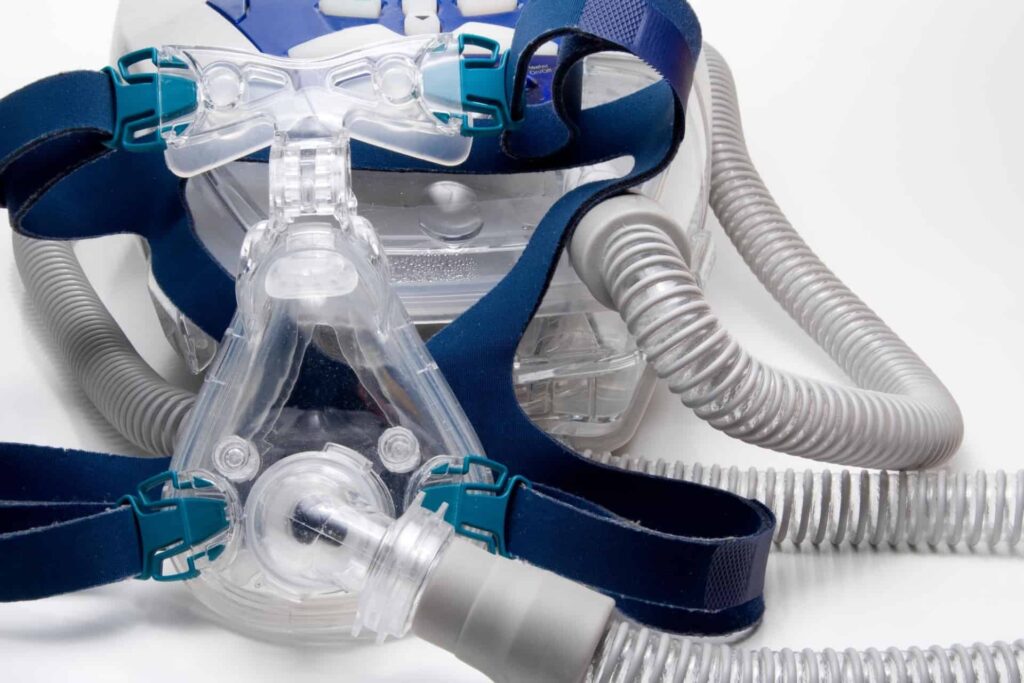
One important aspect of CPAP mask maintenance is the choice of cleaning products. It is recommended to use mild, fragrance-free soap and warm water to clean the mask. Harsh chemicals or abrasive cleaners can damage the mask material and decrease its lifespan. Additionally, it is crucial to thoroughly rinse the mask after cleaning to remove any soap residue that may cause skin irritation.
Another factor to consider when maintaining your CPAP mask is the replacement schedule. While regular cleaning is essential, it is equally important to replace certain parts of the mask periodically. The mask cushions, for example, should be replaced every three to six months, depending on the manufacturer’s recommendations. This ensures a proper seal and prevents leaks that can compromise the effectiveness of the therapy.
Furthermore, it is worth noting that the environment in which you store your CPAP mask can also impact its performance. It is recommended to store the mask in a clean, dry place away from direct sunlight. Exposing the mask to excessive heat or moisture can lead to deterioration of the materials and increase the risk of bacterial growth.
Essential Cleaning Supplies for Your CPAP Mask
Before diving into the cleaning process, it’s important to gather all the necessary supplies. Here are the essential cleaning supplies for your CPAP mask:
- A mild, fragrance-free soap or CPAP mask cleanser
- Warm water
- A small basin or sink
- A soft cloth or sponge
- A towel for drying
Ensuring your CPAP mask is properly cleaned is crucial for maintaining its effectiveness and your overall health. By following a regular cleaning routine, you can prevent the buildup of bacteria, mold, and other contaminants that could potentially lead to respiratory issues. In addition to the basic cleaning supplies listed above, you may also consider investing in a CPAP mask brush specifically designed to reach small crevices and ensure a thorough cleaning.
Choosing the Right Cleaning Solution
When selecting a cleaning solution, it’s important to opt for a mild, fragrance-free soap or a CPAP mask cleanser specifically designed for this purpose. Harsh chemicals and fragrances can cause skin irritations and compromise the integrity of the mask material. Be sure to read the manufacturer’s instructions and guidelines for cleaning solutions that are compatible with your CPAP mask.
Additionally, some CPAP users prefer using natural cleaning solutions such as a mixture of white vinegar and water. This eco-friendly option can effectively remove residue and disinfect the mask without the use of harsh chemicals. Regardless of the cleaning solution you choose, always ensure that it is thoroughly rinsed off to prevent any skin irritation from residual soap or cleanser.
The Importance of Soft Cloth Materials
Using a soft cloth or sponge is crucial to avoid scratching or damaging your CPAP mask during the cleaning process. Avoid using abrasive materials or rough scrub brushes, as they can cause the mask surface to deteriorate and lose its seal over time. Soft and gentle cleaning tools will help maintain the integrity of the mask and extend its lifespan.
For a deeper clean, you can also consider soaking your CPAP mask in a solution of warm water and mild soap for a few minutes before gently wiping it down. This can help loosen any stubborn residue and ensure a more thorough cleaning. Remember to allow your CPAP mask to air dry completely before reassembling it for use to prevent the growth of mold or bacteria.
Step-by-Step Guide to Cleaning Your CPAP Mask
Daily Cleaning Routine
To maintain a clean and hygienic CPAP mask, you should incorporate a daily cleaning routine into your bedtime routine. Follow these step-by-step instructions:
- Disconnect the mask from the CPAP machine and remove the headgear.
- Gently disassemble the mask components, such as the cushion, frame, and any detachable parts.
- Place the disassembled parts in a basin or sink filled with warm water and mild soap or CPAP mask cleanser. Allow them to soak for a few minutes.
- Using a soft cloth or sponge, gently wipe each component to remove any dirt or oils.
- Rinse all parts thoroughly with warm water to remove any soap residue.
- Allow the components to air-dry on a clean towel or cloth.
- Once the mask is completely dry, reassemble the components.
- Inspect the mask for any signs of wear and tear, such as cracks or damaged straps. If necessary, consult the manufacturer for replacement parts.
- Reattach the headgear to the mask, ensuring a snug but comfortable fit.
Weekly Deep Cleaning Process
In addition to your daily cleaning routine, it’s recommended to perform a more thorough cleaning of your CPAP mask on a weekly basis. This helps remove any stubborn residue and ensures a deep clean. Follow these steps:
- Follow the first four steps of the daily cleaning routine to disassemble the mask components and soak them in warm, soapy water.
- After soaking, use a soft toothbrush or cotton swab to gently scrub the small crevices and hard-to-reach areas of the mask.
- Rinse all parts thoroughly with warm water to remove any soap residue.
- Allow the components to air-dry on a clean towel or cloth.
- Perform a visual inspection and make sure all parts are clean and undamaged.
- Once dry, reassemble the mask and attach the headgear.
Now that you have mastered the daily and weekly cleaning routines, let’s delve into some additional tips and tricks to keep your CPAP mask in top-notch condition.
1. Store your CPAP mask in a clean and dry place: After each use, make sure to store your CPAP mask in a clean and dry environment. Avoid placing it on surfaces that may accumulate dust or moisture, as this can lead to bacterial growth or mold formation. Consider using a designated storage case or bag to keep your mask protected and free from contaminants.
2. Replace your mask components regularly: Over time, the cushion, headgear, and other mask components may wear out or lose their effectiveness. It’s important to replace these parts as recommended by the manufacturer to ensure optimal performance and hygiene. Regularly inspect your mask for signs of deterioration, such as discoloration, tears, or a loose fit, and consult the manufacturer for replacement options.
3. Clean your CPAP machine regularly: While cleaning your CPAP mask is essential, don’t forget about the CPAP machine itself. Follow the manufacturer’s instructions for cleaning and maintaining your machine to prevent the buildup of bacteria, dust, or other contaminants. Regularly clean or replace the filters, empty the water chamber, and wipe down the exterior surfaces to keep your machine running smoothly and your therapy effective.
By incorporating these additional tips into your CPAP mask cleaning routine, you can ensure that your mask remains clean, hygienic, and in optimal condition for a comfortable and effective sleep apnea therapy experience.
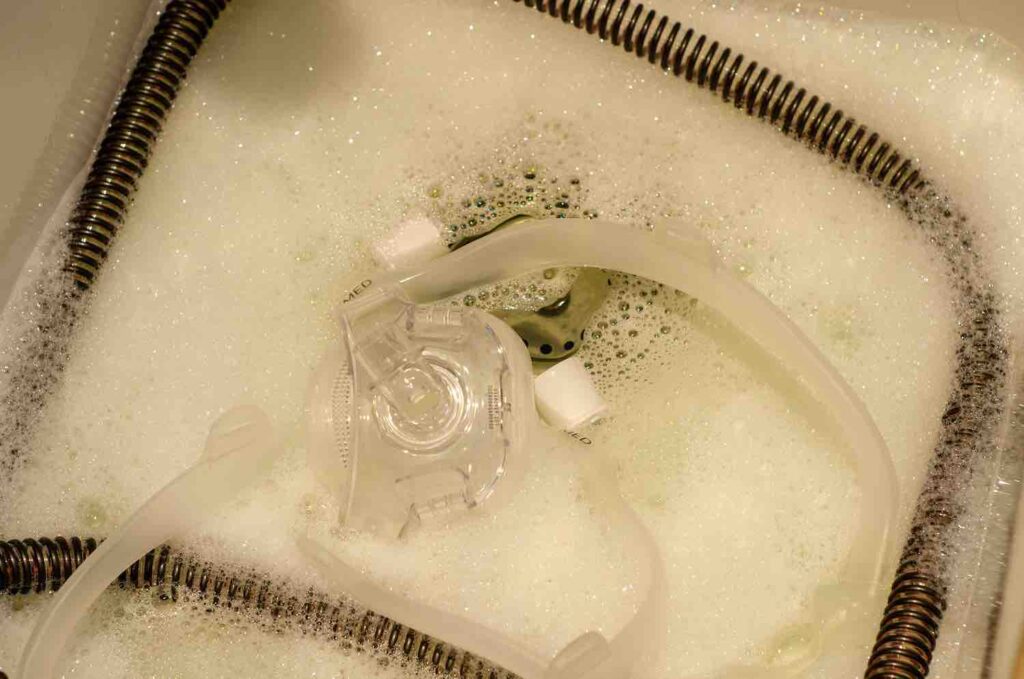
Proper Storage and Handling of Your CPAP Mask
Tips for Safe CPAP Mask Storage
Proper storage of your CPAP mask is essential for maintaining its cleanliness and longevity. Here are some tips for safe CPAP mask storage:
- Store your mask in a clean and dry area, away from direct sunlight.
- Avoid storing the mask near any chemicals or strong-smelling substances that could compromise its material.
- Consider using a dedicated CPAP mask storage case or a clean, breathable bag to protect it from dust and dirt.
- Regularly inspect the storage area for any signs of mold or other contaminants, and clean it if necessary.
Handling Your CPAP Mask to Avoid Damage
Handling your CPAP mask with care is essential to prevent unnecessary damage. Here are some guidelines to follow:
- Always wash your hands thoroughly before handling the mask.
- Avoid pulling or tugging on the mask components, as this can cause them to stretch or tear.
- When adjusting the mask or repositioning it on your face, do so gently to avoid putting excessive stress on the straps or cushion.
- Ensure that the mask is properly aligned and fitted on your face without any excessive pressure.
Regular Maintenance Checks for Your CPAP Mask
Identifying Signs of Wear and Tear
Regularly inspect your CPAP mask for any signs of wear and tear. Over time, the mask surface may become discolored, and the cushion or straps may show signs of degradation. If you notice any cracks, tears, or deformations in the mask components, it’s time to consider replacing them. It’s crucial to maintain a well-functioning and intact mask for optimal performance and comfort.
When to Replace Your CPAP Mask
While regular cleaning and maintenance can extend the lifespan of your CPAP mask, it will eventually need replacement. The frequency of replacements can vary depending on factors such as usage, proper cleaning routine, and manufacturer recommendations. As a general guideline, it’s recommended to replace your CPAP mask every three to six months. However, always refer to the manufacturer’s instructions for specific guidelines regarding the lifespan of your mask model.
By following these cleaning and maintenance guidelines, you can ensure your CPAP mask remains in peak condition for optimal performance. Regular cleaning, proper storage, and diligent maintenance checks will not only extend the life of your CPAP mask but also help you achieve the best possible outcomes from your sleep apnea therapy.
More to read: Tips on how CPAP machines can cause weight gain

